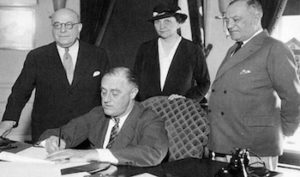
President Roosevelt
*On this date, 1935, the Wagner Act was passed. This was a foundational statute of United States labor law that guaranteed the right of private-sector employees to organize into trade unions, engage in collective bargaining, and take collective action such as strikes.
The Wagner Act harmed Blacks by legalizing labor union monopolies, a Jim Crow for employment. Economists Thomas E. Hall and J. David Ferguson explained: “By encouraging unionization, the Wagner Act raised the number of insiders (those with jobs) who had the incentive and ability to exclude outsiders (those without jobs). Once high wages have been negotiated, employers are less likely to hire outsiders, and thus the insiders could protect their own interests.”
The Wagner Act excluded Blacks by giving labor unions the monopoly power to represent employees in a workplace, since the dominant unions discriminated against Blacks. The Wagner Act had been initially drafted with a provision prohibiting racial discrimination. However, the American Federation of Labor successfully lobbied against it, and it was dropped. AFL unions used their new power, granted by the Wagner Act, to exclude Blacks on a large scale. Booker T. Washington, W.E.B. DuBois, and Marcus Garvey were critical of compulsory unionism.
For instance, Franklin Delano Roosevelt’s New Deal has been hailed for its lofty goals of reforming the American economy and helping the underprivileged. Yet mounting evidence, developed by dozens of economists across the country, shows that the New Deal prolonged joblessness for millions, and Black people were brutally hit.